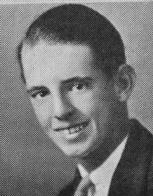|

Howard L. Clark Dead at 84; Ex-Chief at American Express
Howard L. Clark, a visionary executive who helped transform the American Express Company into a modern corporate giant, died on Friday, February 2, 2001, at his home in Greenwich, Connecticut. He was 84. The cause was cardiac arrest, said his son Howard L. Clark, Jr.
When Mr. Clark was named president and chief executive of American Express in 1960, the company's green charge card was two years old and losing money. Mr. Clark rejected an offer to sell the business to Diners Club, a competitor, and chose instead to aim the American Express Card at well-heeled travelers who had just begun to take advantage of the first commerical passenger jets.
The card soon began making money, and with the famous advertising campaign in which recognizable names with not-so-recognizable faces asked, "Do you know me?" it became the company's most profitable business. A second successful advertising campaign, with the slogan "Don't leave home without it," helped increase sales of the company's traveler's checks. By the time Mr. Clark retired as chief executive in 1977, American Express had 650 offices in 108 countries and eight million cardholders.
"He really understood the importance of travel and financial services," said Jonathan S. Linen, vice chairman of American Express, who began his career as Mr. Clark's assistant in 1969. "He moved the company from a travel business that had some financial services to a financial services business that encompassed all aspects of the modern lifestyle."
Howard Longstreth Clark was born in 1916 in South Pasadena, California. Sports was an early love that Mr. Clark pursued for his entire life. He was Southern California junior golf champion in 1933 and a top amateur tennis player who defeated Bobby Riggs five times, his son said.
After graduating from Stanford University in 1937, Mr. Clark attended Columbia University's business school and Harvard Law School. He served as a lieutenant in the Navy during World War II and then joined American Express in 1945 as an assistant in the executive office.
By 1963, soon after Mr. Clark took the company's reins, American Express faced one of the biggest crises in its history. A subsidiary had leased tanks for the storage of vegetable oil from the Allied Crude Vegetable Oil Refining Corporation. The oil in the tanks served as collateral for loans to Allied Crude that were guaranteed by the American Express unit. But Allied Crude had misrepresented the amount of oil in the tanks, and after it filed for bankruptcy, the subsidiary faced more than $100 million in liabilities. As the parent company, American Express was not required to honor the debt, but Mr. Clark announced that the company had a moral obligation to do so.
It turned out to be a prudent business decision. Although some large creditors were angry that American Express ended up paying them only 60 cents on the dollar, the mostly positive reaction in the news media to the company's role in the well-publicized scandal helped cement American Express's reputation for integrity. Thousands of shops and restaurants around the world were reassured that if a customer used an American Express card to make a purchase, the establishment would be paid.
After stepping down as chief executive, Mr. Clark devoted his life to philanthropy and golf. He was chairman of the board of Columbia-Presbyterian Hospital, served on the executive committee of the United States Golf Association and helped establish the World Cup of Golf.
Mr. Clark's first wife, Elsie Dancaster, died in 1959. He is survived by Jean B. Clark, whom he married in 1961; a brother, Bevis Clark of Bonsall, California; three sons, Howard L. Clark Jr. of Greenwich, Stuart Clark of Seattle, and Stephen Clark of Burlington, Vermont; a daughter, Pamela Solley of Washington, Connecticut; five stepchildren; 25 grandchildren; and three great-grandchildren.
The New York Times, February 7, 2001
|